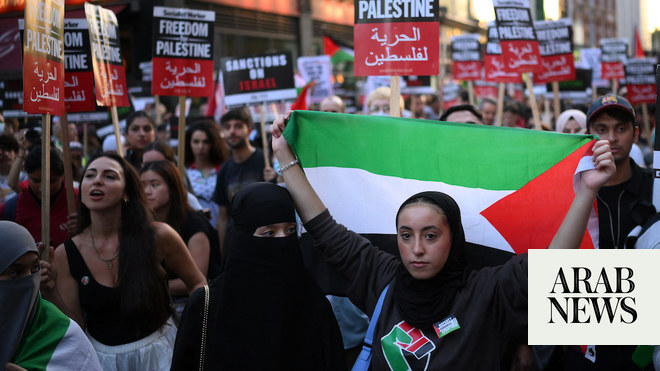
LONDON: Legal action against social media companies, Internet users and trolls is gathering pace over the online reaction to this month’s New Zealand mosque massacre, in which 50 people were killed.
Brenton Tarrant, who has been charged with murder after the terrorist attack on two Christchurch mosques and who live-streamed the attack on social media, is set to appear in court on April 5 where he will face a host of additional charges. Social media companies, people who shared Tarrant’s violent video, and those who posted offensive comments online have all faced legal challenges following the terror attack.
The French Council of the Muslim Faith (CFCM), one of the main groups representing Muslims in France, said on Monday it was suing Facebook and YouTube, Reuters reported.
The group accused the social-media giants of inciting violence by allowing the streaming of footage of the New Zealand massacre on their platforms.
It alleged that the companies had disseminated material that encouraged terrorism, and harmed the dignity of human beings.
A YouTube spokesperson said that it has “removed tens of thousands of videos and terminated hundreds of accounts created to promote or glorify the shooter” since the attack.
“Our teams are continuing to work around the clock to prevent violent and graphic content from spreading, we know there is much more work to do,” they added.
A Facebook representative did not immediately respond to a request for comment when contacted by Arab News. The service said earlier that in the first 24 hours after the shooting, it blocked more than 1.2 million attempts to upload the video and removed a further 300,000 copies that had been uploaded.
But a few hours after the attack, footage could still be found on Facebook as well as YouTube, and both platforms have faced widespead criticism over the footage.
Abdallah Zekri, president of the CFCM’s Islamophobia monitoring unit, said the organization had launched a formal legal complaint against Facebook and YouTube in France, Reuters reported on Monday.
The council said it was suing the French branches of the two tech giants for “broadcasting a message with violent content abetting terrorism, or of a nature likely to seriously violate human dignity and liable to be seen by a minor,” according to a copy of the complaint seen by AFP.
Such acts can be punished by three years’ imprisonment and a €75,000 ($85,000) fine under French law, it was reported.
Other action has also been taken against online trolls who made offensive comments about the terror video — as well as those sharing it.
In the UK, seven people were arrested for hate crimes in the Greater Manchester area over the mosque shootings, with one man having called the gunman a “hero,” the BBC reported. The local police service said it had received 11 reports of offensive behavior related to the attack, with nine of them online.
New Zealand’s legal right of freedom of expression comes with tighter restrictions than in many other countries, meaning people could face legal action for seeking out and watching the video.
As of March 21, at least two people in New Zealand had been charged with sharing the 17-minute video on social media platforms under a law forbidding “possession or dissemination of material depicting extreme violence and terrorism.” More people could be charged for publicizing the attack under a human rights law which bans “incitement of racial disharmony.”
Philip Neville Arps appeared in court in Christchurch on Mar. 20 on two charges related to reposting the video, while an unnamed Christchurch teenager was also denied bail after arrest for posting a photograph of one of the mosques where the attack took place a week beforehand, with a caption that read: “Target acquired.”
Both face a maximum of 14 years in prison if they are found guilty, according to The New York Times.
Even those commenting on the attack who are suspected of inciting racial disharmony can be charged. A woman from northern New Zealand was arrested for Facebook comments she made after the attack and if charged and convicted could face a fine of NZ$7,000 ($4,800).
New Zealand’s chief censor, David Shanks, acknowledged that many people may have viewed the Christchurch mosque video by accident. He warned that, while those who spread the video risked arrest and criminal charges, even possessing the video unintentionally was a crime.
“Every New Zealander should now be clear that this clip is an illegal, harmful and reprehensible record created to promote a terrorist cause,” Shanks said last week.
“If you have a record of it, you must delete it. If you see it, you should report it. Possessing or distributing it is illegal, and only supports a criminal agenda,” he added.
The social media platforms hosting the video could also now face legal issues in New Zealand, with Prime Minister Jacinda Ardern having said that her country, with possible assistance from others, will investigate the role social media played in the attack.
“We cannot simply sit back and accept that these platforms just exist and that what is said on them is not the responsibility of the place where they are published,” she told New Zealand’s Parliament last week. “They are the publisher, not just the postman.”












